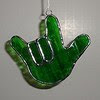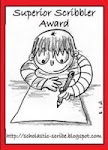The brain is technically a muscle. The old adage 'use it or lose it' applies. When you are a student (be it in a class room, your home or just somewhere out in life) you are learning. And while learning, you are actually making tiny connections in the brain, making it stronger, more durable and hopefully more flexible.
The amount of knowledge in the world is too vast for me to even comprehend. I know I have not even scratched the surface. I want to tell you a little bit about how I home schooled my non-verbal son, but first let me share this thought with you. As you know, this is a new website. What you don't know is that a month ago, the only thing I used the computer for was information searches, word processing and the educational sites my son visits during his schooling. By 'creating' this site, with extensive guides by Google help, I have fired up countless dormant neuro-transmitters I would have likely lost without use. I am very energized by all the new things I'm learning! It's a very euphoric feeling, so what I'm about to say, I say from first hand experience.
I am not a philosopher by profession. Nor a college professor or even a state certified public school teacher. I don't claim to be an expert in anything except my own journey. But I was certified in three states as a home school administrator/instructor. As a somewhat over protective mom who actually wanted her child to learn in school (imagine that...) I soon found that it just wasn't going to happen. So many special needs kids are left behind with untapped potential because no one has either tried to reach & teach them or because they assume the children simply can't learn. But that is rarely the case. These kids are limited by their own handicaps. We (as a society) handicap them further by denying them even the very basic education required to teach them how to read. So many of these kids are so very bright! Open a window to the world for them through reading and they will shine! That said, I'll just step down from my soapbox and compose the post I set out to publish...
A brief synopsis of our journey...
When I first began schooling my son, he wasn't even old enough to start the first grade. It was becoming obvious that his speech was not developing along the normal timeline standards, so I bought some ABC flash cards and began using them. My original emphasis was on the sound each letter made, hoping one day that he would start, well, talking. He didn't, but we continued to try. We engaged the services of a professional speech therapist in Santa Fe, who he absolutely adored (thank you, Judy!). If there was any way he could have, he would have. We all three tried, so hard.
My next step at home, while Judy began introducing him to the Picture Exchange System of communication, was to expand our flash cards to include cards with the beginning words. And a third set for phonics.
As he sat at his little work desk, I would lay out up to 7 or 8 cards at a time, slowly and clearly speaking each letter, sound or word. I made sure to present the cards (within their sets) in different random order, so he would never know which card would come up next. We'd cycle thru the alphabet, the beginning words and the phonics at least twice a day, at least 30 to 45 minutes at a time. But I did not want to limit his education to a desk. We would go outside and explore, play silly games, do story time or just goof around between the 'desk' lessons. His early education may have been unconventional, but it was effective.
I then got a big plastic covered ABC board that I'd go over with him. We practiced 'where is the letter _ ?" And "what comes after the letter _ ?" or "after the letter _ ?" When he reached a success rate of 4 out of 5 correct answers (by pointing to the letter) I knew we could move on. I tried to stay half a step ahead of his learning curve to avoid boredom.
The flash cards allowed me to shuffle the ABC's while the board fixed the letters in their proper order. (Entering the realm of cyberspace -QWERT- with him will be in a future posting...) I started laying out up to four picture flash cards with words like cat, dog, hat, ball, etc. Then, instead of saying "where is the dog?", I began to ask "where is the D - O - G?" (Saying the letters out loud while plainly writing them on a tablet. He began to understand the connection between 'letters', 'words' and 'things'. Soon, I was showing him up to 8 cards at a time and he was responding correctly 4 out of 5 times. But the store bought flash cards had the word printed on the bottom, I wasn't convenienced yet that he had it. So I made our own flash cards from personal photos, pictures out of magazines, anything I found that was both simple and something that he could or one day would be able to relate to. I trimmed them to the size of the other flash cards and laminated them for protection.
Meanwhile, I picked up a new set of flash cards that consisted of over 200 verbs, adverbs, pronouns, etc., all the descriptive or linking words we use in order to read and communicate. But words that don't have a set symbol or picture that link to them. These I showed him individually, saying the word clearly and giving an example of it's use in a sentence. Each time I would cycle through the cards, shuffle them and begin over, I would use the word in a different sentence. Something he was likely to understand or could relate to! Plus, I began introducing him to the picture flash cards I had made, without any word printed on them. Now, when I would write down the word 'turtle', he could find the actual photo of a turtle rather than just look at the word printed on the store bought card. Some days I would briefly run through the very first lessons we did as a warm up, but I tried to keep moving forward for the most part.
By the time he was seven years old, I could write him a fairly simple note of instruction and without any verbal prompt from me, he could read it and respond! He was now running his finger along the words in his children's books, pausing when he came to a word he was unfamiliar with. He would either figure it out on his own using the 'phonics' he had learned or he would bring the book to show me the word for an explanation!
I don't know that I have ever been happier than the day I knew he had mastered the elementary concepts of reading. Because I finally felt that the whole world was open to him! He was beginning to read to follow directions and to learn new things! Often just for the sheer pleasure of reading! Today, when I see him sitting in the window seat absorbed in a book, it thrills me! Isn't that what reading is all about anyway? The pursuit of knowledge or pleasure?
Is there a special needs child in your life? Even if you don't have the time to invest in a one-on-one education, take a few minutes to read a story to them. Read it clearly and with enthusiam! Treat them like 'real' kids! Because they ARE real kids! Even if they can't tell you themselves, they will appreciate you. I'm pretty sure God will appreciate you, too! You will have done a good thing...
I'm not sure who originally said it, but it has been my unofficial life motto: "Even a fool knows you can't reach the stars, but that does not stop the wise man from trying!"
I know this has been a fairly long post and for those that are still with me, I thank you! I invite you to click on the comment link below and share your thoughts or ideas. Fresh prospective is always welcome.
Remember, "Think left and think right and think low and think high. Oh the things you can think up if only you try!" by Dr. Seuss.
Take care all, and happy reading!
D Americanhorse
Tuesday, April 27, 2010
Subscribe to:
Post Comments (Atom)





















2 comments:
What an amazing 'journey'! I am a speech therapist and I found the description of your teaching method to be very interesting. I will suggest this site to some of the parents of my clients. Best of luck to you and your son!
To anonymous - Yes, it has been quite a journey! I am so glad that you found the information useful! I will be happy for the referral! Thank you! D Americanhorse
Post a Comment